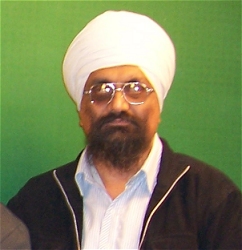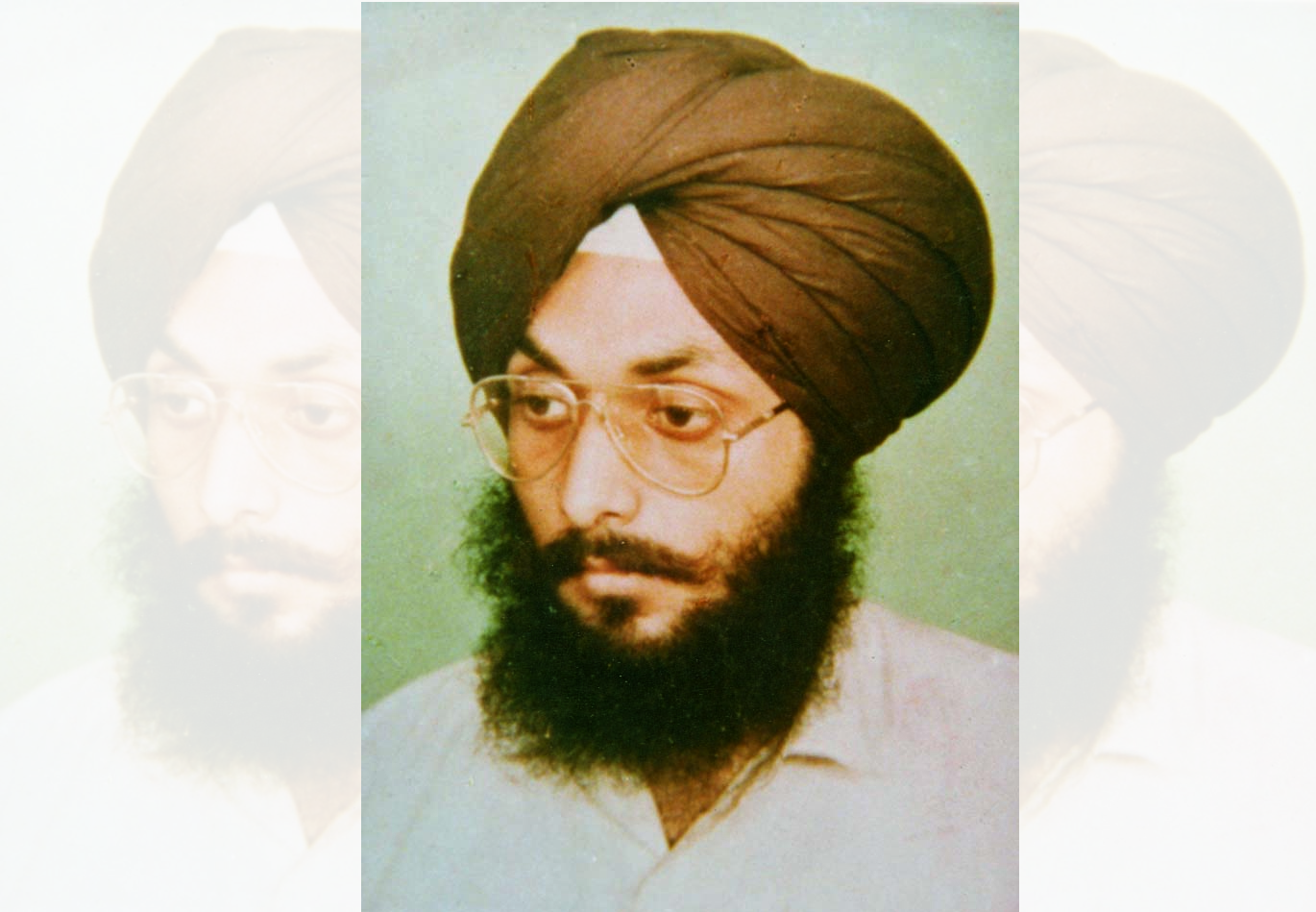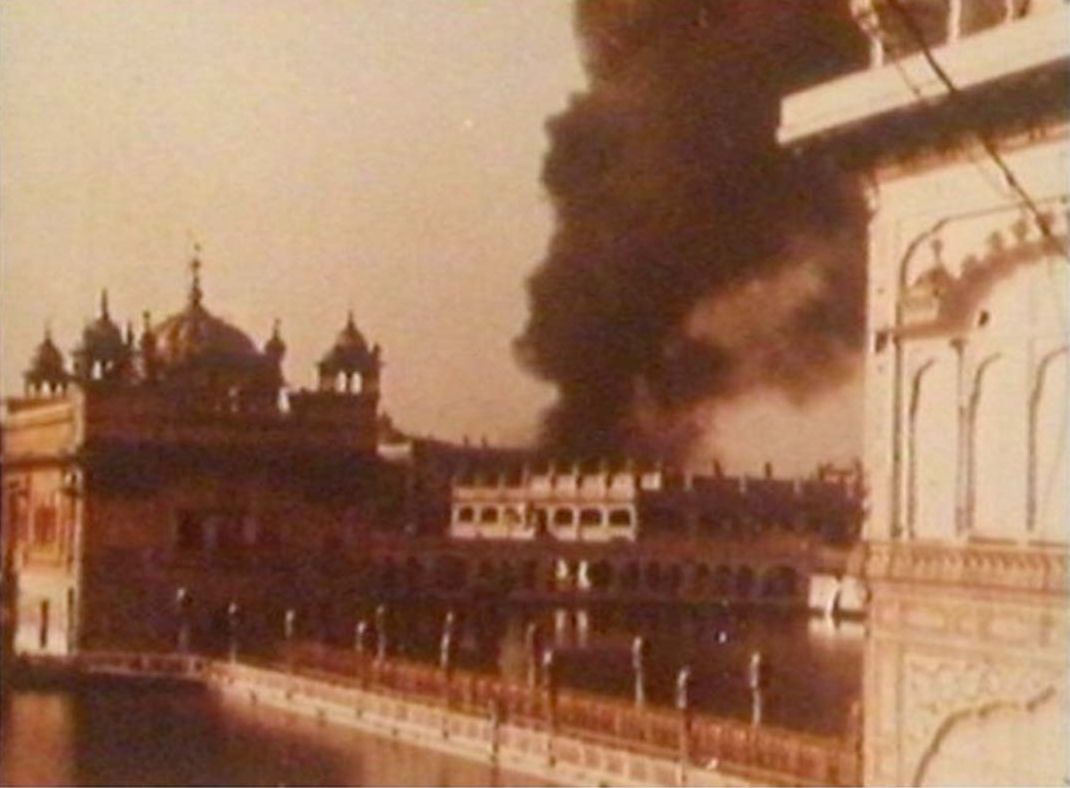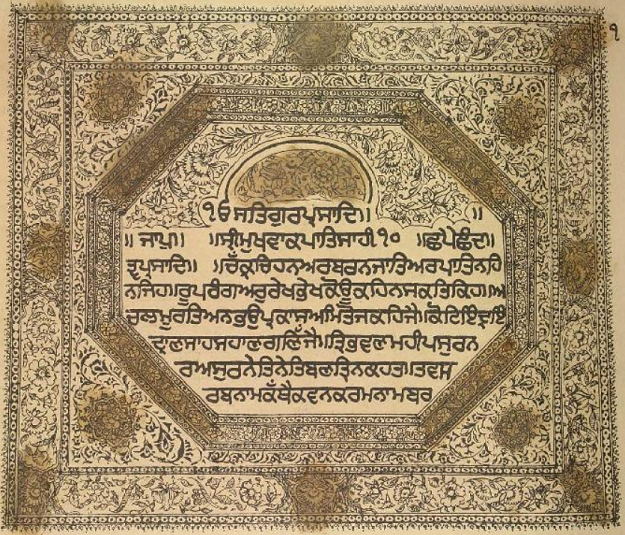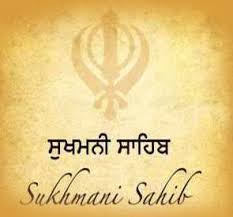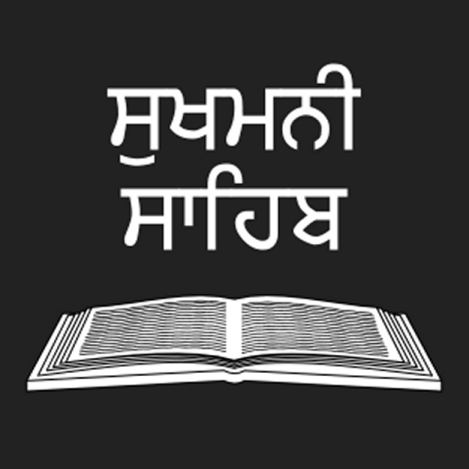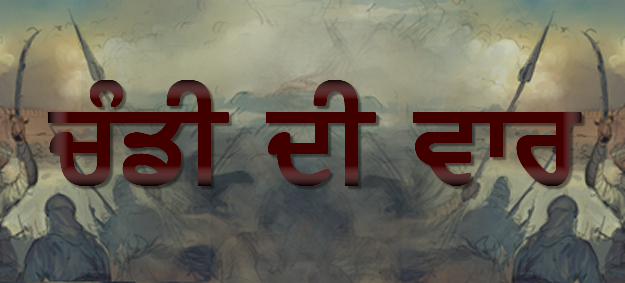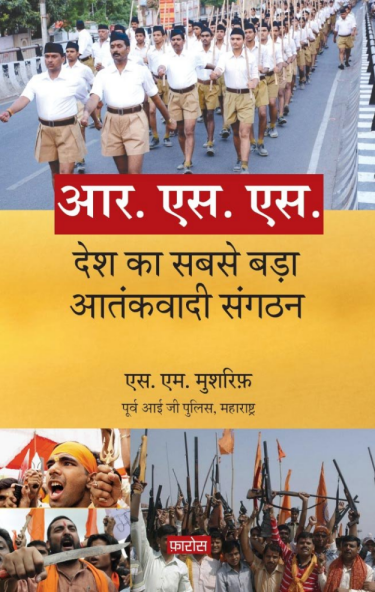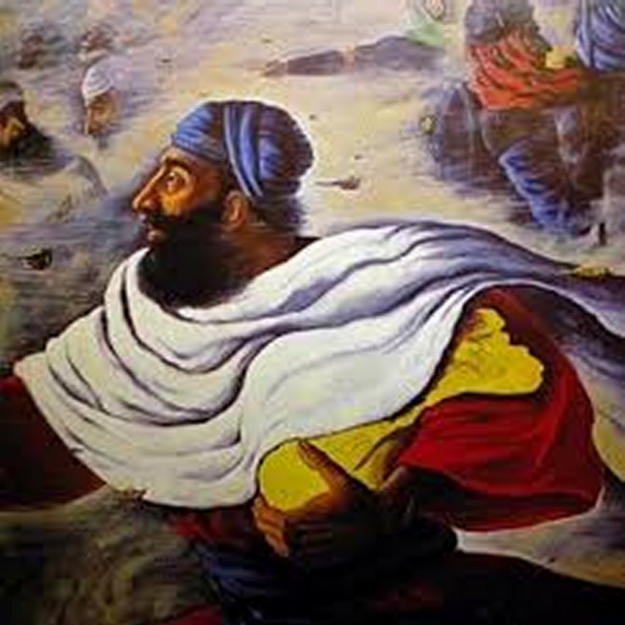
"To the terrified slaves of this country, Guru Gobind Singh said : Rise and fight and die fighting on horseback. This is an oceanic burst of the same glow of life, and this too is of Him. It is more glorious to die than to live as miserable wretches. He poured into our veins that life which could not love without song and freedom. We rose as individuals and as masses shouting for liberty and victory. He gave us freedom of the soul, and we cried for the freedom of our life. We died for it, never mind, if we never got it. Touched by his inspiration, we could no more remain slaves."
Creation and Purpose of the Khalsa
PROF PURAN SINGH
"For ages the doors of true spirituality were locked for the people; the great Guru (Nanak) flung them open to all the four castes" Bhai Gurdas Jee.
"The Sikh has no sect, his commune is his path. Guru Nanak : I am seeking the Man of God (Gurmukh). Our Master (Nanak) tilled land, weeded the wheat crops, and he and his disciples together went and sang and harvested them. Nanak renounces the monastic vagaries of the old Brahminical thought and celebrates the Divine Realisation at once in ploughing, in riding, in home life and in the desert. The Gurus created sweet homes in the Punjab, and in the Khalsa, a freed commune of the Comrades. They were called Brothers (Bhai). Individuals stood as representative symbols of the Khalsa Commune. Their prayers were not individualistic, but communistic. Save O, Lord, the Khalsa (the plural commune) wherever the Khalsa be. Even the individual Sikh was called the Khalsa."
The War and The Sikh Spirit
Recall the last two decades of the 17th Century and the beginning of the 18th Century when we, the Sikhs, in the Punjab, under the command of Guru Gobind Singh, rose to die.
"Our Master, Guru Gobind Singh, called us to death and extinction, for he felt that it was no use living at all without the sense and light of liberty in us. Guru Gobind Singh gave such a vital and martial timbre even to our prayers that we, for the first time in the history of India, saw that the great love, to which our Master was calling, was not a prayer of the crushed people, but a prayer of the victorious as Guru Nanak, the First True King, had called us not to love the Beautiful God-Person of Nature and Creation, but to be so beautiful as to be loved by Him."
"To the terrified slaves of this country, Guru Gobind Singh said : Rise and fight and die fighting on horseback. This is an oceanic burst of the same glow of life, and this too is of Him. It is more glorious to die than to live as miserable wretches. He poured into our veins that life which could not love without song and freedom. We rose as individuals and as masses shouting for liberty and victory. He gave us freedom of the soul, and we cried for the freedom of our life. We died for it, never mind, if we never got it. Touched by his inspiration, we could no more remain slaves."
"The songs of peace in Guru Granth Sahib were being sung as usual at Anandpur, the seat of our Master, but he had a large drum specially made to send forth his Song of the Sword. He called it the 'Ranjit Nagada', the Victory Drum. It was of an enormous size. At Anandpur, Guru Gobind Singh stood by the side of his drum, contemplating the liberty of his people. There is a complete change in the colour and shape of the gathering of the disciples around him. A new nation came fully armed at Anandpur. The Sikh history shows how they fought, but it was all a poetic action. It was waged in the songs of the Great Guru to inspire his people. The War had commenced in the Guru's poems. His impassioned lyrics of war, the Battle of Bhangani in Chandi-Charitra, sound in our ears still. Life rooted in Truth was allowed by Guru Gobind Singh to take the new course of the flood and the storm. Beat, beat drums, sound, blow bugles, blow, echoes the war spirit of the Khalsa. The war-like tones and that clash of steel and that spiritual impatience to die, which we find in the pages of our history has to be appreciated. Surely, no historical accounts show us the poetic genius of Guru Gobind Singh, manifested and enlarged in those wars which were waged, as he says, without any rhyme or reason against him by the enemies of his thought and ideal. The low-statured Hindu kings and the Moghuls could not endure Guru Gobind Singh being hailed as the True King of the people."
"Our mothers and sisters have been voluntary nurses in these poetic wars of Guru Gobind Singh and after. The saints enlisted as ordinary soldiers in love of Him. And our saints who chanted songs were the first in the world to organise a society similar in purpose to the present-day Red Cross Society. They did go inside the camps of friends and foes alike, serving the wounded."
"Our Master, Guru Gobind Singh has not been understood in the land of his birth by such Hindu poets of poetic spirituality as Rabindranath Tagore and by such men of action as Gandhi, because both of them are too much of the old Hindu." "Not that we for ourselves mind this ignorant depreciation of our Liberator by these eminent Hindus, but that, by so doing, they show their own effeteness and bankruptcy of spirit. Incidentally, it also shows how they lost their country through such vague inanities. Without the cleaving sword, Guru Gobind Singh found no way to get out of these maya-meshes of the Hindu stupor and stupidities. It is with peculiar satisfaction, therefore, that we turn away from our country to find our Gurus ideals being celebrated and voiced forth in distant Japan where the spirit of Bushido, the Flash of Sword, mingles with the Nirvanic Peace of the Buddha both in life and art, and in the well-balanced artistic consciousness of Japan. And still farther away, we hear it in the chants of Democracy in the America of Walt Whitmans visions. We, too, do not believe in the Democracy of vote, but in the Democracy of the enlarged vision of man."
"To cultivate one thought or one feeling, a man needs his whole life. It is in appreciation of this fact that the great inspired beings sing in spite of all grossness around them."
"Our Guru Gobind Singh saw that there was no other way to breathe life into the dead masses of the Punjab, but by arming them and beating drums, and flashing sabres in the glare of the sun. Dead ye are, rise to die, perchance to catch the spark of life in the battlefields! Guru Hargobind Singh roamed, as the sun did set on the battlefield of Amritsar, wiping blood from the faces of his wounded disciples, nursing them and pouring into their soul his comfort and blessings. Guru Gobind Singh joined the Muktsar battlefield like the divine father of his children giving them his soul."
"We, the Sikhs, had our resurrection en masse at the Masters word, sung in our ears on the battlefields. The war gave us the fiery baptism of God's warm blood. We died. And that is how our master said we should live. There is no other door to everlasting life but through death, like this, through love, and obedience like this. Very little life is in the ego of man; all is there in the shining sun of his soul. He knew all about the nature of after-death; He led us on." "Our Guru in communion with the cosmic processes concentrated his consciousness on the problem of making man alive, natural and free."
"We the Sikhs, dedicated soldiers of the Master, are already on the march on the open road with the chants of our Master. And these chants pour life into us."
"It is difficult to translate our chants, but one may be given in original here to indicate the power that is in its very sound, and how these very lilts wage a war in their solemn enthusiasm :
khag, khand, bihandang khal dal khandung
ati run mandang barbandang,
bhuj dand askhandang tej parchandang,
jot amandang bhan prabhang
sukh santang karnang durmat Darnang
kil bikh harnung, us sarnang
jai jai jag karan srist aubarang
mum prati parang jai tegung.
(The Songs of the Sword) Guru Gobind Singh."
(ਤ੍ਰਿਭਗੀ ਛੰਦ ॥)
ਖਗ ਖੰਡ ਬਿਹੰਡੰ ਖਲ ਦਲ ਖੰਡੰ ਅਤਿ ਰਣ ਮੰਡੰ ਬਰਬਡੰ ॥
ਭੁਜਦੰਡ ਅਖੰਡੰ ਤੇਜ ਪ੍ਰਚੰਡੰ ਜੋਤਿ ਅਮੰਡੰ ਭਾਨ ਪ੍ਰਭੰ ॥
ਸੁਖ ਸੰਤਾ ਕਰਣੰ ਦੁਰਮਤਿ ਦਰਣੰ ਕਿਲਬਿਖ ਹਰਣੰ ਅਸ ਸਰਣੰ ॥
ਜੈ ਜੈ ਜਗ ਕਾਰਣ ਸ੍ਰਿਸਟ ੳਬਾਰਣ ਮਮ ਪ੍ਰਤਿਪਾਰਣ ਜੈ ਤੇਗੰ ॥
(Unicode Gurmukhi Font)
"In the chants of our master, the cannons boom, the arrows fly, the swords clash, and the very repetition of his chants makes us fly like flames, crying liberty, liberty, liberty. So did not we at Anandpur declare the armed age."
"The Khalsa is a newcomer, fresh from the eternity into the world. The eyes of the Khalsa glow with the vision of the Invisible. The millions on the other side of the River of Life mingle their voices, and the Khalsa is truly one in many. When he runs, he is in trance. On the bed of thorns, he lies on roses. Outside is immaterial; it is the aim of life that matters. The Khalsa is he who has found the centre of life and has enshrined God in the temple of his heart. The Khalsa looks at the world from a supreme height, blessing all, helping all, loving all, with his beautiful looks from the inner self of all life."
"The Khalsa in ordinary life proves himself a loving husband, a kind father, a noble friend, a selfless saint, and a brave soldier to defend the honour of the weak."
"The world with all its gay gardens is to the Khalsa but a camping ground. The Khalsa holds the present life to be but a camp life. Death has no sting for him. If a child is born, he is a Gurus soldier come, and when he dies, its a Gurus soldier gone. The Khalsa sees and believes all as good; nothing is amiss. It is, therefore, when he prays, that he speaks in accents of steel, flint, fire and lightning that move the Heavens with him."
"The tent of the Khalsa is a temple. The Khalsa is the Dharamshala for all. The Khalsa gives a drink, a repast and a hymn of the Guru to all who pass by. The Khalsa has his own language whose flame-words reflect the inner glory of our National Realisation, and of that joy which is supreme in its conquest over the sorrows of the world."
"A whole new idiom has been evolved by the Khalsa to describe the ordinary and commonplace things of life. This is, indeed, camp language, and authenticates the Sikh soldiers love of life and his boundless optimism. A single soldier styles himself as sawa lakh or a hundred thousand and a quarter. When he has run out of his food or rations, he says, the kitchen is tipsy with joy ! The lame, in this language, are called beautiful-footed, the blind the sun-eyed, for they all are Jewels of the Guru !"
"Alas, the Khalsa too is getting under the self-hypnotism of being something, doing something, and is thus degenerating into a common man ! Instead of the old tent life it is the life of the palace that pleases him. This world is getting daily into mud, and unless something happens to restore to him his true faith in God and the Guru-finding expression in every thought and action, a type, wondrous in its grandeur and expression would be gone."
"But this is not the real Khalsa that is decaying. That is the Khalsa there which is ever coming into blossom."
"Guru Gobind ordains that all prayers should be uttered by first saluting Him with a drawn naked sword, in the camp language of the Khalsa."
"When we read in the Japji our Masters picturing the universe as a procession, in the form of a choir of singers coming through ages, and in the Sukhmani as the whole creation in procession passing."
"Our Masters called us Panth, a path or a road. The Sikh is a path."
"The following poem is descriptive of the Khalsa as he was born in Punjab :
Great were the times,
enthusiasm flowed out of human heart like a sea.
And truly that coming of the Khalsa is the coming of a new nation on earth.
An historian of the Sikh period says :
Khalsa came ready-made from the brain of Guru Gobind Singh.
A nation announcing itself.
I myself make the only growth by which I can be appreciated,
I reject none, accept all, then reproduce all in my own forms. A breed whose proof is in time and deeds. What we are we are, nativity is answer enough to objections. We wield ourselves as a weapon is wielded, We are powerful and tremendous in ourselves, We are executive in ourselves, we are sufficient in the variety of ourselves. We are the most beautiful to ourselves, and in ourselves, We stand self-poised in the middle, branching thence over the world."
The Great Truth
"In conclusion, let me declare, that the religion of Guru Nanak is not these miserable ethics, these ideas of good and bad and nobility, these conventions of purity and impurity, these wayside no-truths and half-truths to which the inspired cling with such stupid and universal tenacity, not those steps to perfection counted like the rungs of a ladder, not those catalogues of dos and donts, not those hotch-potch, foolish theologies of the human race, to those human qualities that these unregenerated animals in various multi-coloured faces have been holding in great esteem so long, and still hug close to their prejudices, not those great wastes of human energy and feeling involved in institutionalizing personal charities, in fact, nothing of what men and women think so far is religion."
"The religion of Guru Nanak is one thing needful to the soul of the individual, as well as the soul of groups of individuals. Nature is God. It is personal and alive with feeling. It is a reservoir of inexhaustible life, inspiration and love."
"Acceptance, amazement, spirituality of things are Guru Nanaks exact words. Religion is function of life as it is driven to function."


